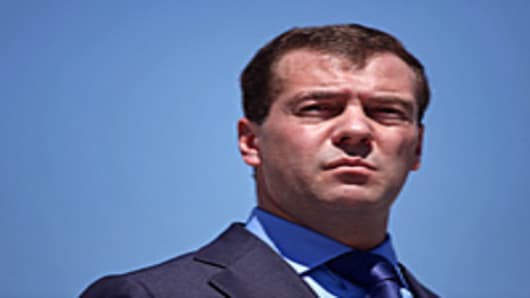With blow-by-blow coverage of the Greek sovereign debt crisis dominating headlines, casual observers could be fooled into thinking that finding a resolution in Athens remains the only issue of strategic concern for the European Union, which has seen its international prestige shaken by the continued economic concerns in its periphery and the apparent lack of coherence within its political elite.
However, as plans for the asset stripping of Greece begin to take shape, the specter of another old, pre-crisis geopolitical concern has raised its head.
DEPA, the Greek natural gas company, is one of the government's key assets up for privatization as the country tries to raise cash to cover its soaring national debt. Small relative to some of its continental peers, DEPA nonetheless could hold considerable strategic importance as Greece emerges as a significant link in a southern gas transit corridor that Brussels hoped would help to diversify Europe's energy supply.
Russia, through its state monopoly Gazprom, is the largest single supplier of natural gas to Europe. Users of the gas and policymakers - particularly those in the new EU members the Baltic states and Eastern Europe - remain concerned that this dependency gives Moscow an undue amount of political leverage and pricing power.
The Third Energy Directive, announced in 2007 as part of the European Commission's attempts to complete an internal market within the EU, is supposed to unbundle supply, production and transmission of energy, which some analysts say should significantly hit Gazprom's business.
"Liberalization of the European market… objectively speaking, is a huge problem for Gazprom," Alexander Rahr, director of the Russia and Eurasia program at the German Council on Foreign Relations (DGAP), told CNBC.com. "It is losing its assets in Poland, the Baltic states, maybe even in Germany, and can hope to conduct its business with Europe only through negotiated exceptions, and that does nothing towards sustainability."
This has also been the rationale behind the EU's support for new pipeline initiatives, including Nabucco, which will connect the union to gas fields in Azerbaijan, and the southern gas corridor, which aims to link Southern Europe to Central Asia via Turkey.
Pipeline projects in the region include the private-sector funded Trans-Adriatic Pipeline (TAP) and the Italy-Greece-Turkey Interconnector (IGTI), a joint venture between DEPA and Edison that has received EU funds.
Some analysts, including Marko Papic at Stratfor, remain cool on Nabucco.
"The natural gas that is supposed to come through Nabucco hasn't come online and it doesn’t seem that Azerbaijan really has any intention to provide all the natural gas to Nabucco, or that it can," Papic told CNBC.com.
"So the European Union decided to reduce its enthusiasm (for Nabucco) by looking at smaller, more viable alternatives, and one of those is the Italy-Greece-Turkey Interconnector. So that's the part where DEPA comes into play, because it's part of that particular alternative," he said.
Gazprom on the Prowl
DEPA is up for sale, and according to a number of analysts, Gazprom is in the race. Gazprom did not respond to requests for comment.
"As the state-owned national gas company in Greece, a stake in DEPA by Gazprom would give the Russians considerable say in what projects are transiting Greece," Papic said.
Gazprom has already expanded into the Balkans, buying a controlling stake in Serbia's gas and oil monopoly, NIS, two years ago, and is "plugging the holes" of alternative channels of supply, according to Papic. It is also increasingly influential in regulatory discussions, he said.
"We've seen in Poland, for example, how the close relationship between the Polish national gas company and Gazprom has allowed Gazprom to have a say in how Warsaw was going to regulate the Third Energy Directive," Papic noted.
"The independent energy regulator ended up not really being as stringent as the European Commission would have wanted," he said. "In Greece, ownership of DEPA will not mean that these (transit) projects are going to be scrapped, it just may mean that they may accept, for example, Russian natural gas.
"The Russians are looking to slowly geographically block out as much as possible, and Greece fits into that," Papic added. "One possibility would be that they would use their influence in Greece's natural gas infrastructure to pump their own gas through these supposed alternatives."
Kjetil Tungland, managing director of the Trans-Adriatic Pipeline, which aims to connect Italy to gas supplies on the Turkish border via Greece, told CNBC.com that there could be a more commercial, less strategic reason for the mooted interest.
"Gazprom is supplying DEPA with volume for the Greek market in the area of 2-3 billion cubic meters. These contracts expire in 2016, which, in this business, is more or less like tomorrow… Gazprom might be interested in buying into that to control the prolongation of those contracts," he said.
However, he concurred that the increasing influence that Gazprom could exert over discussions on regulation and transportation is a likely motivation.
"I think the European Commission is struggling to construct a comprehensive policy, and they can see now where one very important decision regarding diversification is going to be taken far away from Brussels," he added.
German Influence
Baltic and Eastern European members of the EU, particularly Poland, still maintain that the Kremlin has neo-imperialist ambitions in their backyard, and see any kind of dependence as dangerous.
The old core nations, particularly Germany, which has strong bilateral commercial relations with Russia, are far more sanguine, preferring a strategy of cautious engagement and acknowledgement of Moscow's geopolitical and security concerns.
Interactions between the EU and Russia have warmed after a four year period where clashes over interference in Georgia and the Ukraine, as well as the "cyber war" with Estonia "brought relations to a stalemate," DGAP's Rahr said.
Germany is unwilling to risk its lucrative business deals with Russia, according to Rahr. "They understand very well that business with Russia is not a one-way street. They cannot say to the Russian Federation, open your borders to us and at the same time close the German markets for the Russians because of political reasons," he said.
"The fear of Russian investors who hide behind the democratic mask but in reality belong to the KGB - which is very popular in the Baltic States, or in Poland or other parts of Central and Eastern Europe - do not exist in Germany so much. It exists, but only on a certain level," he added.
Germany's resistance to anti-Russian rhetoric is significant, analysts said, not least because it undermines the coherence of the European position.
Berlin's willingness to phase out nuclear energy by 2020 following the Fukushima nuclear crisis in Japan shows that the Germans are willing to back up their political stance with actions that could deepen their exposure to Russian gas, Stratfor's Papic noted.
The construction of the Nordstream pipeline linking Russia to Germany is another demonstration, he added.
"You have Nordstream coming online, which is a direct line between the EU's most powerful member state and Russia, so you can't take really that strategic concern that the European Commission is exhibiting seriously," he said.
"The German-Russian relationship has deepened and that's why there doesn't seem to be a unified front on the European end... There's really no coherence anymore with Europe's policy. It's not just that there's a different perceptions of Russia within Europe, it comes down to Germany."
Germany's current economic pre-eminence in Europe, as well as its leading role in resolving the euro zone debt crisis, means that its decisions carry weight in Europe.
Berlin has taken a leading role in managing the Greek situation, and is likely to have a say on many of the mechanisms being designed for its resolution – including the new administration being created to manage the privatization process. This means that German pragmatism over Russia is likely to overcome the EU's longer term strategic concerns, according to Papic. If Gazprom bids for DEPA, no one is likely to stop them.
"If Germany is in charge of handling the euro zone crisis, and with what we have seen in the past 6-12 months, why would we assume that the Germans would say no to Gazprom's purchase of DEPA?" he said. "There's just no evidence to back that up. There's no evidence that Germany is thinking about this at that strategic level."



